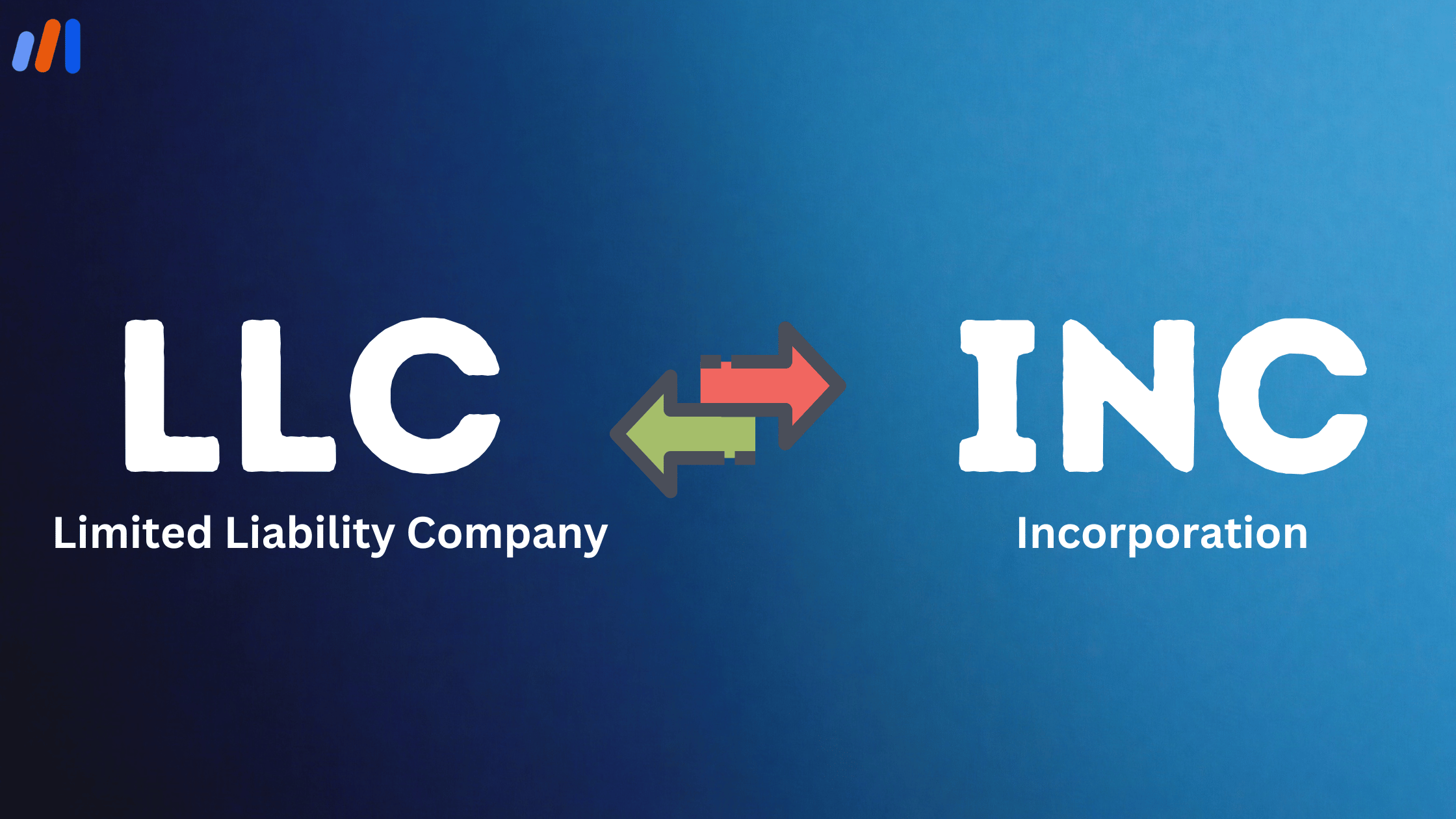Starting a business is a significant milestone that comes with numerous decisions, one of the most important being your choice of business structure.
Any business structure you decide to settle on will serve as the skeleton of your business operations. The structure chosen will determine the amount of tax, the amount of risks undertaken, various avenues of financing, as well as the potential growth of the company in the long run.
Two of the most popular choices for business structures are limited liability companies and incorporations. However, one must understand these choices in detail because each structure has specific limits and gains.
It is important to have a comprehensive grasp of the objective of the business, its potential to grow and scale, along the target market one intends to serve.
Let us balance their risks and benefits and decide which business structures to prefer with this guide. Before this, we will address the distinctions between LLC vs Inc.
Why Choosing the Right Business Entity Matters
In a nutshell, a business entity represents more than just a piece of paper. It is what drives the company. The type of entity that a person selects affects the taxation of the business, the limited liability that is provided to a person, and the level of complexity or simplicity where there is a provision to operate the business.
A business entity’s role can shift various aspects of a business alongside the decisions that run it, for example:
- Liability: In this instance separating business liability from the individual’s liability, issued so that one’s assets are not at risk.
- Taxes: Setting up a tax structure that will minimize the payable amount. In small businesses, taxation often weighs down the company.
- Funds: attracting potential investors and confirming loans for business purposes.
- Scalability: Creating pathways for expansion through effective governance structures and outsourcing equity.
- Operational Simplicity: Executing the administrative authorities involved with the role of being an entrepreneur.
Making the right choices can help you avoid a lot of time, costs, and legal issues, while also laying down solid foundations for future progress.
LLC vs. Inc.: A Quick Overview
Many limited liability of LLCs and Incorporations (Inc.) are present, but there are large differences in the areas of structure and compliance, taxation, and other obligations;
LLCs: These are very flexible, quite easy to operate, and meant for small to medium-sized businesses. This features the blend of sole tradership and partnerships with limited liability offered by corporations.
Incorporations: Most suitable for companies that are looking to grow: the Inc. entities offer a system of governance and provisions for raising capital through selling shares. They present higher administrative burdens and risks of double taxation, however.
Knowledge of these distinctions is very vital to direct you in making the best choice for your business.
What is an LLC (Limited Liability Company)?
An LLC, or limited liability company, is a hybrid business form that combines limited liability protection with the operational and tax benefits of a sole proprietorship or partnership.
Highlights and Advantages of an LLC
Limited Liability Limitation:
Owners are not held personally liable for the debts or the obligations of the entity, this ensures that personal assets remain safe from misconstrued business threats.
Pass-through Tax:
An LLC is a pass-through or ignored entity that passes its profits and losses along to the owners’ tax returns, allowing avoidance of the double taxation encumbered by some corporations.
Operating Flexibility:
In contrast to an S-Corporation, an LLC does not need a Board of Directors, shareholders, or formal meeting minutes which eases the control.
Tailor Ownership Level:
A member may define the roles in the agreement based on the operating proportions of any ownership.
Reduced Compliance Requirements:
An LLC has fewer annual filing and reporting obligations than a corporate structure does.
Who Should Choose an LLC?
An LLC is perfect for:
- Small businesses do not want the rigmaroles that are associated with a corporate structure but also want some form of liability protection.
- Freelancers, consultants, and other self-employed individuals.
- Early stage Start-Ups.
- Family-owned businesses and partnerships seeking to de-mystify management.
What is an Inc. (Incorporation)?
Any business classified as Incorporation (or Inc.) can be categorized as such due to its being recognized as a legal entity distinctly separate from its shareholders as its legal owners. While this offers extra liability coverage, it comes with additional legal requirements.
How Incorporation Works
Articles of Incorporation need to be filed with the respective state and bylaws adopted by the appropriate business owners along with a stock issuance. A corporation is run by its stockholders with a Board of Directors and Officers being the shareholders having different duties from one another.
Types of Corporations: C-Corp vs. S-Corp
C-Corporation (C-Corp):
- The basic type of corporation.
- Allow two levels of taxation: first the profits of the corporation and second the shareholder’s payments whereby they are taxed again.
- Others do have limitations since there are no share class requirements about the number of shareholders.
- Suits businesses that intend to get a large influx of money over a short time or even go public.
S-Corporation (S-Corp):
- In this type of corporation, shareholders avoid being taxed twice by having company profits paid to shareholders.
- Can only limit owners to 100, and needs, all of the shareholders to be either citizens or residents of the United States.
- Includes the advantages of corporate liability while also getting the taxation benefits of partnerships.
Ownership and Structure
Determining and outlining a business’s ownership and controlling body is key to decision-making processes, the distribution of the profit, and the execution of duties. Ownership in LLCs and corporations and the definition as well as the internal organizational structures are all completely different.
How Ownership Works in LLCs
LLCs have a simple and flexible ownership structure of several members. Ownership is vested in “members,” who can be an individual, partnership, corporation, or other LLC. An LLC has no limits concerning the number of members and the percentage of ownership may be customized to each of the member’s contributions and agreements.
Important Components of LLC Ownership:
- Membership Interests: Members of the LLC are not issued shares but interests in the LLC which defines their stake in the LLC.
- Distribution of Profits: Profits or losses may be apportioned as per the operating agreement but need not be proportional to the percentage of ownership.
- Management Structure for the LLCs: LLCs could be self, member-managed, or managed by managers appointed for this purpose.
- Restrictions on Ability to Raise Equity: LLCs cannot issue shares and therefore cannot effectively raise equity funds.
- Leadership Dynamics: Members usually do get involved directly in decision-making hence, LLCs are more grassroots-centered type of organizations and less hierarchical than corporations.
Shareholders and Stock in Corporations
There are two people Partnerships and LLCs, while Independents (Inc.) has the more systematic and advanced structure of ownership, due but is based on stock and shareholders. Shares of ownership are owned by owners who are constitutive members of the company and this includes a limited number of members who share ownership with their disability.
Key Features of Corporation Ownership:
- Ownership: Business owners are called shareholders meaning they “share” in ownership by holding stock of the said company.
- Types of Stock: Common stock (with voting rights) and preferred stock (without voting rights but with a preference over common stock in receiving dividends) are both types of stocks that corporations may issue.
- Scalable Ownership: As there is a mechanism for buying, selling, or transferring the shares, such corporations make it easy to raise funds as well as change ownership.
- Equity and Investment Opportunities: Corporations can solicit capital by selling their equity among different investors, through venues, and even the general public (the case of companies listed on the stock exchange).
- Decision-Making: After the allocation of shares, the shareholders are entitled to elect a certain number of members of the board of directors the board of directors is responsible for the general corporate policies, but all the operational duties should be directed to the different officers of the company (Such as the President, Vice President) There is thus a great degree of separation in the overall governance structure/self.
Key Differences in Decision-Making and Roles
LLCs:
- Decision-Making: Unless the rules are defined in the operating agreement, the majority of the decisions are made by members.
- Roles: Business managers can be members or hired. The divisions are not strict and depend on the current tasks of the company.
- Flexibility: Members informally customize responsibilities and make quick changes to the structure as needed.
Corporations:
- Decision-Making: Governance always goes in the order: of shareholders, board of directors, officers; and always, large decision-making boards as a rule.
- Roles: For proper functioning, corporations have to have such defined roles.
- Shareholders: The ones who have the right to vote depending on the number of shares they hold.
- Board of Directors: These are chosen by the shareholders to determine policies to be implemented in the company and supervise management.
- Management: Day-to-day management is in the hands of the senior officers such as the CEO, the CFO, etc.
- Regulations: Corporate bylaws govern the corporations, and these include a schedule of annual general or special meetings with their relevant books, some resolutions are necessary for the conduct of certain business matters.
Pros and Cons of an LLC
LLC Advantages
- Bureaucratic Requirements: Compared to corporations, an LLC is established with fewer formality and is quickly and inexpensively launched.
- Economic Benefits: Members have the opportunity to select taxation as a sole proprietorship, partnership, or as corporation.
- Protection of Assets: The owner’s assets are secure as a liability on business obligations is limited.
- Management: There are limited provisions for meeting minutes and record keeping.
Limitations of an LLC
- Limited Ability to Raise Investment Resources: LLCs cannot issue stock which restricts their exposure to venture capital.
- Inconsistency in the Laws: Such regulations are not uniform throughout the country which leads to problems when expanding such businesses.
- Distrust: The same feels to some industries that see individuals running undertakings in the form of incorporated entities to be more professional.
Pros and Cons of an LLC
Benefits of Incorporation
- Considerable Amount of Funds: Since corporations can sell stocks, they can appeal to investors.
- Decentralized Authority: Various positions make sure that decisions are implemented quickly and that people are accountable for their actions.
- Existence of the Corporation: Being a cloned structure, corporations are not susceptible to changes in their shareholders.
Limitations of Incorporation
- More Establishment Expenses: Incorporation is also associated with the higher cost of both establishment and continued maintenance.
- Responsibilities of the Corporations: These documents are in the form of reports with details of revenue, records, accounts, and board of directors, which every corporation has to follow.
- Double Tax: Profits earned by C-Corps have taxation at two times and this reduces the return on investment.
When to Transition from an LLC to a Corporation
With time, the challenges faced by a business may change and in the process, an owner may feel that changing from the set-up of an LLC to that of a corporation is best to suit their future requirements. There are 2-3 situations like this such as:
1. Your business needs substantial funding from investors or venture capitalists.
Generally, it is recommended to choose the corporate structure as the business grows and plans to obtain substantial finance or attract institutional investors. Corporations have a legal framework to raise equities thereby managing the investor’s expectations well.
2. You plan to issue stock or go public.
In cases where employees, investors, or potential buyers might need stock options, a corporate structure is the best bet from the start. This is because corporations are built for offering equities and any plans of going public also call for a corporate entity.
3. Industry norms or client expectations favor a corporate structure.
Certain industries like technology, finance, and large-scale manufacturing also seem to cut across with the impression of a corporate structure. Because of the stability, confidence, and professionalism that corporations offer, it is easy for them to attract clients, partners, and investors.
Final Thoughts and Recommendations
Whether to form an LLC or a corporation mainly depends on the objectives of the business, the preferred form of taxation, and how the owner intends to control the business. Here’s a quick recap of when to choose each structure:
Choose an LLC when you do not want to comply a lot and require flexibility simplicity, and minimal regulation. In particular, LLCs are highly appropriate for small and medium businesses, freelancers, or those who want ease of management with pass-through taxation.
Corporation formation is to be preferred if your plans include growing the business, looking for investment, or if you are entering a competitive market that is much more formal. Whenever a corporation’s business is to grow significantly, seek investments, or go to IPO then they suit better.
How to Start Forming Your Business Structure
After choosing the business formation, it’s time to rock and roll. Here is a walk-through of the best procedures to start up your enterprise:
1. Define your goals and evaluate your funding needs.
Consider your aspirations now and what they will be in the future. Do you want a business with no restrictions or are you prepared to seek investments? Do you want to expand your business as fast as possible or do you want it to be small and manageable?
2. Research state-specific requirements for LLCs and corporations.
Each state has different laws and requirements when forming an LLC or corporation. Be sure to understand the requirements for the state in which you will form the enterprise.
3. Consult with legal and financial professionals to determine the best fit.
In any case, it’s useful to ask for help from those who can explain how the specifics of each business structure interfere in practice, in this case, legal and financial. They can offer effective suggestions that are unique to your case.
4. File the necessary documents to register your business entity.
Regardless of whether you are transferring assets to LLCs or forming a corporation, such entities are required to operationalize appropriate forms through the provincial Secretary of State. Typically the required forms are Articles of Organization in the case of LLCs or Articles of Incorporation in the case of a corporation.
Ready to Take the Next Step?
EasyFiling assists clients with the entire process of business registration including any legalities involving business formation. Their team aims to develop business solutions from the very beginning, whether multiple assets are to be allocated to LLCs or a corporation to be formed.
Book a free consultation with Easyfiling today to begin your LLC or Incorporation journey.
File Your LLC Today
25$ off with a coupon
Lock in EasyFiling's transparent rates and get lifetime compliance support at no extra cost.
Get Started Now







